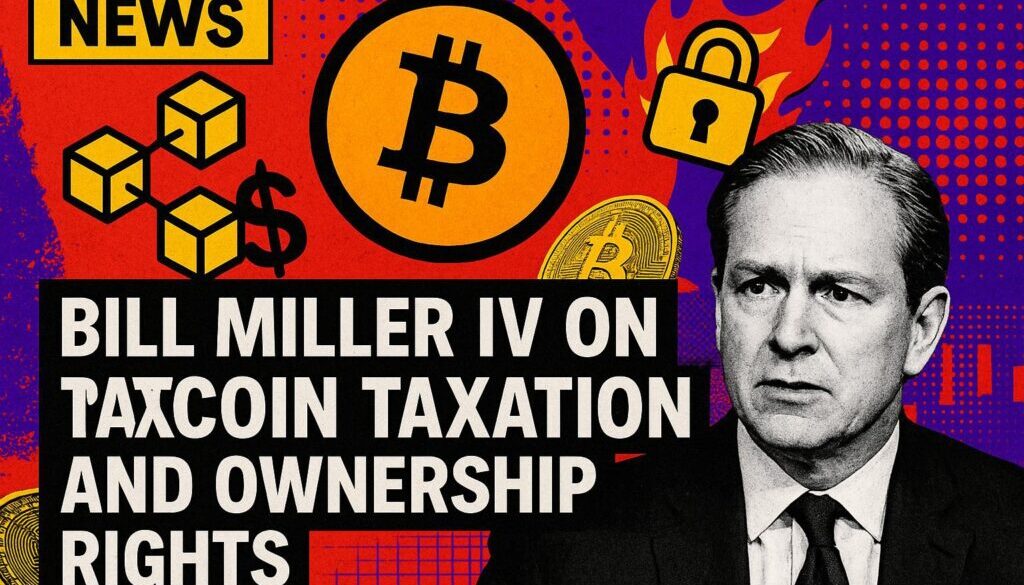Bill Miller IV on Bitcoin Taxation and Ownership Rights

Bill Miller IV, the renowned chief investment officer at Miller Value Partners, has ignited a fascinating debate surrounding Bitcoin’s unique position in the financial world. His recent appearance on the Coin Stories podcast shed light on a controversial argument: governments should not tax Bitcoin. Miller’s core assertion challenges the very foundation of traditional taxation, suggesting that Bitcoin, unlike conventional assets, operates outside the mechanisms that typically justify government levies.
Miller’s Argument Against Bitcoin Taxation
Miller’s core argument hinges on Bitcoin’s decentralized nature. He contends that Bitcoin’s structure eliminates the need for government-backed enforcement of property rights. Think about it: traditional assets like real estate require governments to maintain records, verify deeds, and protect ownership through legal frameworks. Taxes are often paid to fund these very administrative and protective services.
Bitcoin, however, operates on a global, decentralized ledger, a blockchain, which inherently verifies ownership without any central authority or government intervention. Because Bitcoin was not created by the government and does not rely on its systems for property verification, Miller argues that the rationale for taxing it diminishes significantly. While the IRS currently classifies Bitcoin as property for tax purposes, Miller suggests this classification might overlook Bitcoin’s fundamental differences, potentially opening the door for it to be treated uniquely from other taxable assets.
Challenges in Bitcoin Taxation
Beyond Miller’s philosophical argument, the practicalities of taxing cryptocurrencies present immense challenges for governments globally. One major hurdle is the pseudonymous nature of crypto transactions. Unlike bank accounts tied to identifiable individuals, Bitcoin transactions on the blockchain are linked to addresses, making it difficult for tax authorities to track ownership and identify taxpayers.
Governments largely rely on self-reporting, which can lead to compliance issues and make it challenging to accurately assess crypto holdings. While the IRS is stepping up its scrutiny, introducing new reporting standards like Form 1099-DA for digital asset transactions, the sheer volume and global, borderless nature of crypto continue to pose significant enforcement difficulties. Taxpayers navigating this evolving landscape must stay vigilant about changing regulations and compliance requirements.
Current Tax Treatment of Digital Assets
Currently, the Internal Revenue Service (IRS) classifies digital assets, including Bitcoin, as property for U.S. tax purposes. This means that when you buy, sell, or even use Bitcoin for payments, it’s treated much like any other piece of property, such as stocks or real estate.
Consequently, general tax principles apply. If you sell Bitcoin for more than you bought it, you realize a capital gain, which is subject to capital gains tax. Conversely, if you sell it for less, you incur a capital loss. This existing framework significantly impacts investment strategies and financial reporting for anyone holding or transacting in Bitcoin. It’s this classification that Miller is directly challenging, advocating for a re-evaluation based on Bitcoin’s unique characteristics.
The Evolving Landscape of Bitcoin Investment
Miller also highlighted the absence of a wash sale rule for Bitcoin, a rule that prevents investors from selling an asset at a loss and repurchasing it almost immediately to claim a tax deduction. This absence further differentiates Bitcoin from traditional securities. While he admits uncertainty about the future of property taxes on Bitcoin, he firmly believes there are strong arguments against it.
The unclear taxation rules also create significant hurdles for traditional asset managers looking to invest in Bitcoin. The complexities of buying, selling, and reporting make it a challenging asset to integrate into conventional portfolios. Miller concluded that this evolving taxation landscape signifies that we are still in the very early stages of Bitcoin investment.
Bill Miller IV’s insights spark a crucial conversation about how governments should view and tax decentralized digital assets. His argument, rooted in Bitcoin’s self-sovereign nature, challenges conventional wisdom and highlights the need for a more nuanced understanding of this groundbreaking technology as it continues to reshape the global financial landscape.


